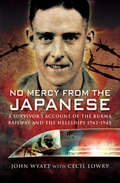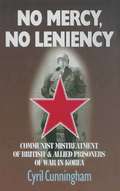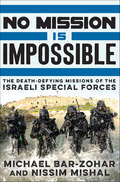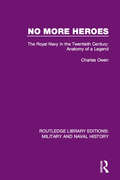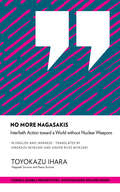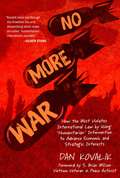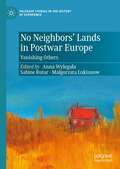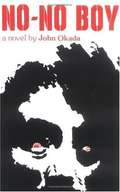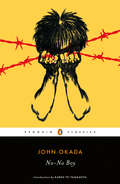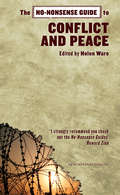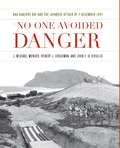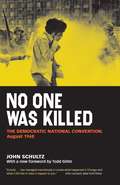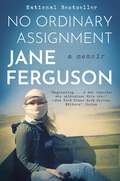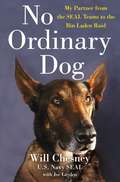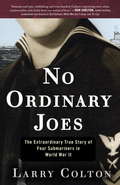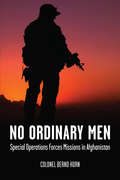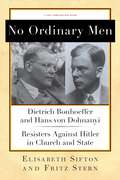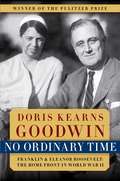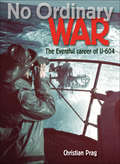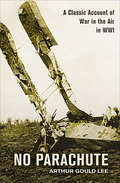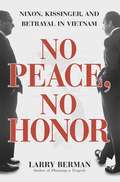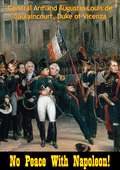- Table View
- List View
No Mercy (A Jonathan Grave Thriller #1)
by John GilstrapWhen those inside the corridors of power need help outside the law, they know who to call. Jonathan Grave, covert rescue specialist, always gets results. No names. No feds. No trace evidence. When an Indiana college student is abducted, Jonathan and his team of ace operatives unravel a deadly scheme the government wants ignored. Someone wants to control a devastating secret. Someone rich, powerful, and willing to kill anyone to get it. Even the people Jonathan loves most.
No Mercy from the Japanese: A Survivors Account of the Burma Railway and the Hellships, 1942–1945
by Cecil Lowry John WyattBy the laws of statistics John Lowry should not be here today to tell his story. He firmly believes that someone somewhere was looking after him during those four years. Examine the odds stacked against him and his readers will understand why he hold this view. During the conflict in Malaya and Singapore his regiment lost two thirds of its men. More than three hundred patients and staff in the Alexandra Military hospital were slaughtered by the Japanese he was the only known survivor. Twenty six percent of British soldiers slaving on the Burma Railway died. More than fifty men out of around six hundred died aboard the Aaska Maru and the Hakasan Maru. Many more did not manage to survive the harshest Japanese winter of 1944/45, the coldest in Japan since record began. Johns experiences make for the most compelling and graphic reading. The courage, endurance and resilience of men like him never ceases to amaze.
No Mercy, No Leniency: Communist Mistreatment of British & Allied Prisoners of War in Korea
by Cyril CunninghamThis is the most authoritative and comprehensive British account ever published of the brutal North Korean and Chinese mistreatment of British POWs during the Korean War.The author, a psychologist, was a Scientific Advisor to the POW Intelligence Organisation during the Korean War.He explains in detail how many prisonors were bribed, starved, flogged and tortured into informing on their compatriots and infiltrated into every prisoner group to sniff out potentional "progressives and reactionaries".
No Mission Is Impossible: The Death-Defying Missions of the Israeli Special Forces
by Michael Bar-Zohar Nissim MishalA riveting follow-up to Michael Bar-Zohar and Nissim Mishal’s account of the most memorable missions of the Mossad, No Mission Is Impossible sheds light on some of the most harrowing, nail-biting operations of the Israeli Special Forces.In No Mission Is Impossible, Michael Bar-Zohar and Nissim Mishal depict in electrifying detail major battles, raids in enemy territory, and the death- defying commando missions of the Israeli Special Forces. The stories are often of victories, but sometimes also of immense failures, and they run side by side with the accounts of the lives and accomplishments of some of Israel’s most prominent figures. Captivating and eye-opening, No Mission Is Impossible is essential reading for anyone interested in understanding how these crucial missions shaped Israel, and the world at large.
No More Heroes: The Royal Navy in the Twentieth Century: Anatomy of a Legend (Routledge Library Editions: Military and Naval History #19)
by Charles OwenThis book, originally published in 1975 and authored by an ex-Naval officer, assesses the performance and management of the Royal Navy in the twentieth century. It examines the nature and tasks of the twentieth century Navy, by tracing the fortunes of it under successive First Sea Lords. It examines how the higher echelons of the service have altered and how and why naval policy has changed. Among other issues the book discusses the actions of Beresford and Fisher, Beaty and Jellifcoe, Chatfield, Pound and Mountbatten. It appraises Churchill, the Invergordon Mutiny and the strains fo the 1930s; discusses the Navy’s role in two World Wars and post-war disarmament.
No More Nagasakis: Interfaith Action toward a World without Nuclear Weapons (Distinguished Speaker Series)
by Toyokazu IharaIn a speech delivered in Japanese at Cornell University, atomic bomb survivor Tomokazu Ihara describes the bombing of his home city of Nagasaki in 1945, traces his activism against nuclear proliferation, and issues an impassioned plea for a world without nuclear weapons. Cornell Global Perspectives is an imprint of Cornell University's Mario Einaudi Center for International Studies. The works examine critical global challenges, often from an interdisciplinary perspective, and are intended for a non-specialist audience. The Distinguished Speaker Series presents edited transcripts of talks delivered at Cornell, both in the original language and in translation.
No More Parades: Large Print (Transaction Large Print Ser. #2)
by Ford Madox Madox FordNo More Parades is the second book in Ford Madox Ford&’s landmark No More Parades series. It sets forth the maddening chaos that is war, from the meddling of civilians who have no knowledge or care of how much pain and disaster their meddling will cause to the destruction of relationships and lives brought on by the stress of war. This second instalment focuses on the main character Tietjens and his wife Sylvia&’s tempestuous relationship over the course of three days during the war. Ford writes books about war like no other. Ford&’s experience writing propaganda for the British government and his combat experience make the four books in this series some of the best books ever written about war in any language. Simply a masterpiece.
No More War: How the West Violates International Law by Using 'Humanitarian' Intervention to Advance Economic and Strategic Interests
by Dan Kovalik"Kovalik helps cut through the Orwellian lies and dissembling which make so-called 'humanitarian' intervention possible." —Oliver Stone War is the fount of all the worst human rights violations―including genocide―and not its cure. This undeniable truth, which the framers of the UN Charter understood so well, is lost in today&’s obsession with the oxymoron known as &“humanitarian" intervention.No More War: How the West Violates International Law by Using 'Humanitarian' Intervention to Advance Economic and Strategic Interests sets out to reclaim the original intent of the Charter founders to end the scourge of war on the heels of the devastation wrought by WWII. The book begins with a short history of the West&’s development as built upon the mass plunder of the Global South, genocide and slavery, and challenges the prevailing notion that the West is uniquely poised to enforce human rights through force. This book also goes through recent &“humanitarian" interventions carried out by the Western powers against poorer nations (e.g., in the DRC, Congo, and Iraq) and shows how these have only created greater human rights problems – including genocide – than they purported to stop or prevent.No More War reminds the reader of the key lessons of Nuremberg – that war is the primary scourge of the world, the root of all the evils which international law seeks to prevent and eradicate, and which must be prevented. The reader is then taken through the UN Charter and other human rights instruments and their emphasis on the prevention of aggressive war.
No Neighbors’ Lands in Postwar Europe: Vanishing Others (Palgrave Studies in the History of Experience)
by Anna Wylegała Sabine Rutar Małgorzata ŁukianowThis book focuses on the social voids that were the result of occupation, genocide, mass killings, and population movements in Europe during and after the Second World War. Historians, sociologists, and anthropologists adopt comparative perspectives on those who now lived in ‘cleansed’ borderlands. Its contributors explore local subjectivities of social change through the concept of ‘No Neighbors’ Lands’: How does it feel to wear the dress of your murdered neighbor? How does one get used to friends, colleagues, and neighbors no longer being part of everyday life? How is moral, social, and legal order reinstated after one part of the community participated in the ethnic cleansing of another? How is order restored psychologically in the wake of neighbors watching others being slaughtered by external enemies? This book sheds light on how destroyed European communities, once multi-ethnic and multi-religious, experienced postwar reconstruction, attempted to come to terms with what had happened, and negotiated remembrance.
No-No Boy
by John OkadaA Japanese-American struggles with his identity and decisions during World War II
No-No Boy
by John OkadaThe first Japanese American novel: a powerful, radical testament to the experiences of Japanese American draft resisters in the wake of World War IIA Penguin ClassicAfter their forcible relocation to internment camps during World War II, Japanese Americans were expected to go on with their lives as though nothing had happened, assimilating as well as they could in a changed America. But some men resisted. They became known as "no-no boys," for twice having answered no on a compulsory government survey asking whether they were willing to serve in the U.S. armed forces and to swear allegiance to the United States. No-No Boy tells the story of one such draft resister, Ichiro Yamada, whose refusal to comply with the U.S. government earns him two years in prison and the disapproval of his family and community in Seattle. A touchstone of the immigrant experience in America, it dispels the "model minority" myth and asks pointed questions about assimilation, identity, and loyalty.Celebrate Asian American and Pacific Islander (AAPI) Heritage Month with these four Penguin Classics: America Is in the Heart by Carlos Bulosan (9780143134039) East Goes West by Younghill Kang (9780143134305) The Hanging on Union Square by H. T. Tsiang (9780143134022) No-No Boy by John Okada (9780143134015)
The No-Nonsense Guide to Conflict and Peace
by Sabina Lautensach Helen Ware Deanna Iribarnegaray Peter GreenerThe twentieth century was the most bloody in history, and already conflict in this century has taken a heavy toll. Most wars are now within countries rather than between states, and often it is civilians that suffer most, especially women and children.This is an invaluable guide for students, peace groups, and activists. It examines the changing types of war, including the war on terror and ethnic conflict such as in Rwanda, the role of diplomacy and the UN, and what steps ordinary people are taking to rebuild communities. It offers ideas and inspiration for creating lasting peace.
No One Avoided Danger: Nas Kaneohe Bay And The Japanese Attack Of 7 December 1941
by J. Michael Wenger Robert J. Cressman John F. Di Virgilio"No One Avoided Danger" is a detailed combat narrative of the 7 December 1941 Japanese attacks on NAS Kaneohe Bay, one of two naval air stations on the island of O'ahu. Partly because of Kaneohe’s location--15 air miles over a mountain range from the main site of that day’s infamous attack on Pearl Harbor--military historians have largely ignored the station’s story. Moreover, there is an understandable tendency to focus on the massive destruction sustained by the U. S. Pacific Fleet. The attacks on NAS Kaneohe Bay, however, were equally destructive and no less disastrous, notwithstanding the station’s considerable distance from the harbor. The work focuses on descriptions of actions in the air and on the ground at the deepest practical, personal, and tactical level, from both the American and Japanese perspectives. Such a synthesis is possible only by pursuing every conceivable source of American documents, reminiscences, interviews, and photographs. Similarly, the authors sought out Japanese accounts and photography from the attacks, many appearing in print for the first time. Information from the Japanese air group and aircraft carrier action reports has never before been used. On the American side, the authors also have researched the Official Military Personnel Files at the National Personnel Records Center and National Archives in St. Louis, Missouri, extracting service photographs and details of the military careers of American officers and men. The authors are among the first historians to be allowed access to previously unused service records. The authors likewise delved into the background and personalities of key Japanese participants, and have translated and incorporated the Japanese aircrew rosters from the attack. This accumulation of data and information makes possible an intricate and highly integrated story that is unparalleled. The interwoven narratives of both sides provide a deeper understanding of the events near Kane'ohe Bay than any previous history.
No One Was Killed: The Democratic National Convention, August 1968
by John SchultzWhile other writers contemplated the events of the 1968 Chicago riots from the safety of their hotel rooms, John Schultz was in the city streets, being threatened by police, choking on tear gas, and listening to all the rage, fear, and confusion around him. The result, No One Was Killed, is his account of the contradictions and chaos of convention week, the adrenalin, the sense of drama and history, and how the mainstream press was getting it all wrong."A more valuable factual record of events than the city’s white paper, the Walker Report, and Theodore B. White’s Making of a President combined."—Book Week"As a reporter making distinctions between Yippie, hippie, New Leftist, McCarthyite, police, and National Guard, Schultz is perceptive; he excels in describing such diverse personalities as Julian Bond and Eugene McCarthy."—Library Journal"High on my short list of true, lasting, inspired evocations of those whacked-out days when the country was fighting a phantasmagorical war (with real corpses), and police under orders were beating up demonstrators who looked at them funny."—Todd Gitlin, from the foreword
No Ordinary Assignment: A Memoir
by Jane Ferguson"A haunting memoir of disarming honesty. . . a remarkable testament to the anguish and the beauty of foreign correspondence.”—Roger Cohen, New York Times Paris bureau chief and author of An Affirming Flame From award-winning journalist Jane Ferguson, an unflinching memoir of ambition and war—from The Troubles to the fall of Kabul.Jane Ferguson has covered nearly every war front and humanitarian crisis of our time. She reported from Yemen as protests grew into the Arab Spring; she secured rare access to rebel-held Syria, where foreign journalists were banned, to cover its civil war. When the Taliban claimed Kabul in 2021, she was one of the last Western journalists to remain at the airport as thousands of Afghans, including some of her colleagues, struggled to evacuate. Living with sectarian violence was nothing new to Ferguson. As a child in Northern Ireland in the 1980s and ‘90s, The Troubles meant bomb threats and military checkpoints on the way to school were commonplace. Books by Dervla Murphy and Martha Gellhorn offered solace from her turbulent family, and an opportunity to study Arabic in Yemen came as a relief—and a ticket to the life in journalism she imagined. Without family wealth or connections, she began as a scrappy one-woman reporting team, a borrowed camera often her only equipment. Networks told her she had the wrong accent, the wrong appearance, not enough “bang-bang shoot-‘em-up.” Still, Ferguson threw herself into harm’s way time and again, determined to give voice to civilian experiences of war. In the face of grave violence and suffering, this seemed a small act of justice, no matter the risks.Ferguson’s bold debut chronicles her unlikely journey from bright, inquisitive child to intrepid war correspondent. With an open-hearted humanity we rarely see in conflict stories, No Ordinary Assignment shows what it means to build an authentic career against the odds.
No Ordinary Determination: Percy Black and Harry Murray of the First AIF
by Jeff HatwellAn epic tale of two ordinary individuals thrown into theextraordinary and surreal world of the Gallipoli campaignas soldiers of the First AIF in WWI.Percy Black and Harry Murray were plain hard-workingAustralians whose paths crossed in Western Australiawhen they enlisted in support of country and empire. Thepowerful narrative paints a complex and thorough pictureof the heroism, loyalty, inventiveness, mateship, stoicismand strength of the many individuals, on all sides, caughtup in the horror of the ‘war to end all wars’.
No Ordinary Dog: My Partner from the SEAL Teams to the Bin Laden Raid
by Joe Layden Will ChesneyTHE INSTANT NATIONAL BESTSELLERNo Ordinary Dog is the powerful true story of a SEAL Team Operator and military dog handler, and the dog that saved his life. Two dozen Navy SEALs descended on Osama bin Laden’s compound in May 2011. After the mission, only one name was made public: Cairo, a Belgian Malinois and military working dog. This is Cairo's story, and that of his handler, Will Chesney, a SEAL Team Operator whose life would be irrevocably tied to Cairo's.Starting in 2008, when Will was introduced to the SEAL canine program, he and Cairo worked side by side, depending on each other for survival on hundreds of critical operations in the war on terrorism. But their bond transcended their service. Then, in 2011, the call came: Pick up your dog and get back to Virginia. Now.What followed were several weeks of training for a secret mission. It soon became clear that this was no ordinary operation. Cairo was among the first members of the U.S. military on the ground in Pakistan as part of Operation Neptune Spear, which resulted in the successful elimination of bin Laden.As Cairo settled into a role as a reliable “spare dog,” Will went back to his job as a DEVGRU operator, until a grenade blast in 2013 left him with a brain injury and PTSD. Unable to participate in further missions, he suffered from crippling migraines, chronic pain, memory issues, and depression. Modern medicine provided only modest relief. Instead, it was up to Cairo to save Will's life once more—and then up to Will to be there when Cairo needed him the most.
No Ordinary Joes: The Extraordinary True Story of Four Submariners in War and Love and Life
by Larry ColtonOn April 23, 1943, the seventy-man crew of the USS Grenadier scrambled to save their submarine—and themselves—after a Japanese aerial torpedo sent it crashing to the ocean floor. Miraculously, the men were able to bring the sub back to the surface, only to be captured by the Japanese.No Ordinary Joes tells the harrowing story of four of the Grenadier’s crew: Bob Palmer of Medford, Oregon; Chuck Vervalin of Dundee, New York; Tim McCoy of Dallas, Texas; and Gordy Cox of Yakima, Washington. All were enlistees from families that struggled through the Great Depression. The lure of service and duty to country were not their primary motivations—they were more compelled by the promise of a job that provided “three hots and a cot” and a steady paycheck. On the day they were captured, all four were still teenagers.Together, the men faced unimaginable brutality at the hands of their captors in a prisoner of war camp. With no training in how to respond in the face of relentless interrogations and with less than a cup of rice per day for sustenance, each man created his own strategy for survival. When the liberation finally came, all four anticipated a triumphant homecoming to waiting families, loved ones, and wives, but instead were forced to find a new kind of strength as they struggled to resume their lives in a world that had given them up for dead, and with the aftershocks of an experience that haunted and colored the rest of their days. Author Larry Colton brings the lives of these four “ordinary” heroes into brilliant focus. Theirs is a story of tragedy and courage, romance and war, loss and endurance, failure and redemption. With a scope both panoramic and disarmingly intimate, No Ordinary Joes is a powerful look at the atrocities of war, the reality of its aftermath, and the restorative power of love.From the Hardcover edition.
No Ordinary Men: Special Operations Forces Missions in Afghanistan
by Colonel Bernd Horn General T.J. LawsonThe first in-depth book that sheds light on Canada’s elite warriors who operate in the shadows. In 2001 the Canadian government sent elements of the elite Joint Task Force 2 counter-terrorist unit to Afghanistan to assist the United States in its global war on terror as part of Operation Enduring Freedom. Withdrawn a year later, JTF 2 returned to Afghanistan in 2005 to once again assist the Americans with the desperate struggle in the shadows to capture or kill Taliban leaders, facilitators, and bomb makers. No Ordinary Men peels back the cloak of secrecy and reveals four untold special operations that JTF 2 operators conducted in 2005–06 in which their courage, tenacity, and impressive capabilities meant the difference between life and death. The book takes the reader to the Taliban sanctuaries deep in the Afghan hinterlands and provides a glimpse of Canada’s remarkable legacy in special operations.
No Ordinary Men: Dietrich Bonhoeffer and Hans von Dohnanyi, Resisters Against Hitler in Church and State
by Fritz Stern Elisabeth SiftonDuring the twelve years of Hitler's Third Reich, very few Germans took the risk of actively opposing his tyranny and terror, and fewer still did so to protect the sanctity of law and faith. In No Ordinary Men, Elisabeth Sifton and Fritz Stern focus on two remarkable, courageous men who did--the pastor and theologian Dietrich Bonhoeffer and his close friend and brother-in-law Hans von Dohnanyi--and offer new insights into the fearsome difficulties that resistance entailed. (Not forgotten is Christine Bonhoeffer Dohnanyi, Hans's wife and Dietrich's sister, who was indispensable to them both.)From the start Bonhoeffer opposed the Nazi efforts to bend Germany's Protestant churches to Hitler's will, while Dohnanyi, a lawyer in the Justice Ministry and then in the Wehrmacht's counterintelligence section, helped victims, kept records of Nazi crimes to be used as evidence once the regime fell, and was an important figure in the various conspiracies to assassinate Hitler. The strength of their shared commitment to these undertakings--and to the people they were helping--endured even after their arrest in April 1943 and until, after great suffering, they were executed on Hitler's express orders in April 1945, just weeks before the Third Reich collapsed.Bonhoeffer's posthumously published Letters and Papers from Prison and other writings found a wide international audience, but Dohnanyi's work is scarcely known, though it was crucial to the resistance and he was the one who drew Bonhoeffer into the anti-Hitler plots. Sifton and Stern offer dramatic new details and interpretations in their account of the extraordinary efforts in which the two jointly engaged. No Ordinary Men honors both Bonhoeffer's human decency and his theological legacy, as well as Dohnanyi's preservation of the highest standard of civic virtue in an utterly corrupted state.and to try to remove him, for they knew it was a barbarism that would be a burden of guilt for their nation ever after. Bonhoeffer and Dohnanyi embodied qualities all too rare among their countrymen at the time: integrity and hard work, selflessness, and remarkable bravery. Sifton and Stern honor both Bonhoeffer's human decency and his theological legacy, as well as Dohnanyi's preservation of the highest standard of civic virtue in an utterly corrupted state. Dohnanyi remarked that they had simply taken "the path that a decent person inevitably takes." Their story expands our understanding of the responses to the Nazi regime and exemplifies how morality can endure in the face of depravity and horror.
No Ordinary Time: Franklin & Eleanor Roosevelt: The Home Front in World War II (Reading Group Guides Ser.)
by Doris Kearns GoodwinDoris Kearns Goodwin&’s Pulitzer Prize–winning classic about the relationship between Franklin D. Roosevelt and Eleanor Roosevelt, and how it shaped the nation while steering it through the Great Depression and the outset of World War II.With an extraordinary collection of details, Goodwin masterfully weaves together a striking number of story lines—Eleanor and Franklin’s marriage and remarkable partnership, Eleanor’s life as First Lady, and FDR’s White House and its impact on America as well as on a world at war. Goodwin effectively melds these details and stories into an unforgettable and intimate portrait of Eleanor and Franklin Roosevelt and of the time during which a new, modern America was born.
No Ordinary War: The Eventful Career of U-604
by Christian PragU-604 was a standard Type VIIC of which over 600 were built, and at first glance her six war patrols might seem typical - but they were far from ordinary.Using the official war diary and the eyewitness testimony of survivors this book weaves a detailed but vivid tapestry of life and action during some of the fiercest convoy battles of the Atlantic war. Often counter-attacked, but seeming to bear a charmed life, U-604 had her successes, including inflicting the largest single loss of US mercantile personnel in one attack. However, the drama of her career pales alongside the epic story of her loss. After repeated bombing by American aircraft, Hltring, the boat's CO, organised an amazing rescue attempt by two other U-boats and finally scuttled U-604. This rescue itself went badly wrong, leading to the loss of one more U-boat and Hltring's suicide in controversial circumstances. Based on interviews with survivors and illustrated with previously unpublished photos, it is simply an extraordinary story.
No Parachute: A Classic Account of War in the Air in WWI
by Arthur Gould LeeThis account of the Great War puts you right in the action—from one of the fighter pilots of the Royal Flying Corps. From the young airmen who took their frail machines high above the trenches of World War I and fought their foes in single combat, there emerged a renowned company of brilliant aces—among them Ball, Bishop, McCudden, Collishaw, and Mannock—whose legendary feats have echoed down half a century. But behind the elite pilots in the Royal Flying Corps, there were many hundreds of airmen who flew their hazardous daily sorties in outdated planes without ever achieving fame. Here is the story of one of these unknown flyers—a story based on letters written in the day, telling of a young pilot’s progress from fledgling to seasoned fighter. His descriptions of air fighting, sometimes against the Richthofen Circus, of breathless dogfights between Sopwith Pup and Albatros, are among the most vivid and immediate to come out of World War I. Arthur Gould Lee, who rose to the rank of air vice-marshal and also authored the classic Open Cockpit, brilliantly conveys the immediacy of air war, the thrills and the terror, in this honest and timeless account.
No Peace, No Honor
by Larry BermanIn 1973, Henry Kissinger shared the Nobel Peace Prize for the secret negotiations that led to the Agreement on Ending the War and Restoring Peace in Vietnam. Nixon famously declared the 1973 agreement to be "peace with honor"; America was disengaging, yet South Vietnam still stood to fight its own war. Kissinger promptly moved to seal up his personal records of the negotiations, arguing that they are private, not government, records, and that he will only allow them to be unsealed after his death. No Peace, No Honor deploys extraordinary documentary bombshells, including a complete North Vietnamese account of the secret talks, to blow the lid off the true story of the peace process. Neither Nixon and Kissinger's critics, nor their defenders, have guessed at the full truth: the entire peace negotiation was a sham. Nixon did not plan to exit Vietnam, but he knew that in order to continue bombing without a congressional cutoff, he would need a fig leaf. Kissinger negotiated a deal that he and Nixon expected the North to violate. Ironically, their long-maintained spin on what happened next is partially true: only Watergate stopped America from sending the bombers back in. This revelatory book has many other surprises. Berman produces new evidence that finally proves a long-suspected connection between candidate Nixon in 1968 and the South Vietnamese government. He tells the full story of Operation Duck Hook, a large-scale offensive planned by Nixon as early as 1969 that would have widened the war even to the point of bombing civilian food supplies. He reveals transcripts of candidate George McGovern's attempts to negotiate his own October surprise for 1972, and a seriocomic plan by the CIA to overthrow South Vietnam's President Thieu even as late as 1975. Throughout, with page-turning dialogue provided by official transcriptions and notes, Berman reveals the step-by-step betrayal of South Vietnam that started with a short-circuited negotiations loop, and ended with double-talk, false promises, and outright abandonment. Berman draws on hundreds of declassified documents, including the notes of Kissinger's aides, phone taps of the Nixon campaign in 1968, and McGovern's own transcripts of his negotiations with North Vietnam. He has been able to double- and triple-check North Vietnamese accounts against American notes of meetings, as well as previously released bits of the record. He has interviewed many key players, including high-level South Vietnamese officials. This definitive account forever and completely rewrites the final chapter of the Vietnam war. Henry Kissinger's Nobel Prize was won at the cost of America's honor.
No Peace With Napoleon!
by George Libaire Jean Hanoteau General Armand Augustin Louis de CaulaincourtThis book concludes the Memoirs of General de Caulaincourt begun in With Napoleon in Russia. The period covered is that tragic stretch when Napoleon's defeat was assured, but the future still uncertain. Caulaincourt was closest to Napoleon, closest to the representatives of the European powers in whose hands lay his fate, of anyone who has left the story.This is again a very intimate picture of the Emperor, and adds to historic knowledge in contributing actual evidence of what really happened in regard to Napoleon's attempted suicide, after the decision to separate him from his wife and child and hold him in Elba.A must-read for all Napoleon fans, and for all who read and liked the earlier book.

